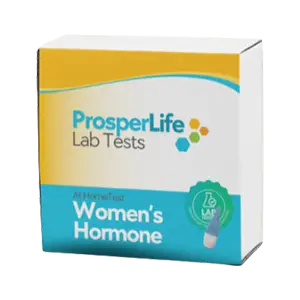GLOBAL SHIPPING | USA SHIPS FREE OVER $75
GLOBAL SHIPPING | USA SHIPS FREE OVER $75

Women who want to gain valuable insights into hormone levels for evaluating infertility, sexual dysfunction, and menopause-related conditions. Take control of your well-being with our comprehensive testing services. Identify imbalances and proactively improve your health. Get started today!
Weight Management
Cortisol is produced by the adrenal glands and is the body’s primary stress hormone. It enhances your brain’suse of glucose (sugar) and increases the availability of substances that repair tissues. Its release is increased in response to stress and low blood-glucose levels. It helps regulate metabolism, affects blood pressure, and servesas an anti-inflammatory. Chronically elevated levels of cortisol are an indication a body is stressed which canmake healthful eating habits difficult to maintain – the result is often stress-eating which leads to overeating and weight gain.
High cortisol levels – high cortisol levels can be caused by many underlying issues such as overactivity or cancerof the pituitary or adrenal glands, chronic stress and medication side effects. Estrogen can also increase cortisol levels in your blood.
SYMPTOMS OF HIGH CORTISOL:
Low cortisol levels – low cortisol levels mean the adrenal glands aren’t making enough cortisol. This could becaused by Addison’s disease which could be caused by cancerous cells, removal of the adrenal glands, certain genetic disorders, and certain antifungal medications.
SYMPTOMS OF LOW CORTISOL:
Follicle-stimulating hormone, or FSH, is a hormone that is secreted by the anterior pituitary gland. It helps control a woman’s menstrual cycle and egg production. Too much or too little FSH can cause a variety of problems in women.
High levels of FSH in women can be caused by menopause and polycystic ovarian syndrome in which a woman’s hormones are out of balance.
SYMPTOMS OF HIGH FSH:
Low levels of FSH are commonly caused by rapid weight loss or being very underweight.
SYMPTOMS OF LOW FSH:
Luteinizing hormone, or LH, is produced and released in the anterior pituitary gland. This hormone plays a significant role in controlling the production of estrogen in the ovaries in females. LH plays an important role in sexual development and functioning. Too much or too little LH can cause a variety of problems, including delayed puberty in children, infertility and menstrual difficulties in women.
High levels of LH in women can be caused by menopause and polycystic ovarian syndrome in which a woman’s hormones are out of balance.
SYMPTOMS OF HIGH LH:
Low levels of LH in women are commonly caused by recent rapid weight loss, malnutrition, being severely underweight or if the pituitary gland is not working correctly.
SYMPTOMS OF LOW LH:
Progesterone is a female sex hormone that is mainly produced in the ovaries following ovulation each month. It helps regulate the menstrual cycle and maintenance of pregnancy. Without this hormone, a body cannot prepare the right environment for the egg and developing fetus. If pregnant, low levels of progesterone can increase risk of pregnancy loss.
High progesterone levels may mean you are pregnant, have a cyst on your ovaries or a molar pregnancy – an abdominal growth that can cause symptoms of pregnancy.
SYMPTOMS OF HIGH PROGESTERONE:
Low progesterone levels may be caused by menopause, problems with the ovaries or miscarriage.
SYMPTOMS OF LOW PROGESTERONE:
Estradiol is the strongest of the three estrogens in the body and is an important factor in the female reproductive system. In women, estradiol’s main function is to mature and then maintain the reproductive system. Estradiol levels cause the maturation and release of the egg as well as the thickening of the uterus lining to allow a fertilized egg to implant. As women age, levels of this hormone decrease significantly.
SYMPTOMS OF HIGH ESTRADIOL:
SYMPTOMS OF LOW ESTRADIOL:
Women produce testosterone in their ovaries and adrenal glands. Testosterone is one of the factors responsible for regulating sex drive, bone mass, fat distribution, muscle mass and production of red blood cells.
High Testosterone: Among women, a high testosterone level may indicate the presence of polycystic ovary syndrome which impacts 6% to 10% of premenopausal women.
SYMPTOMS OF HIGH TESTOSTERONE:
Low Testosterone: Low testosterone levels are called Testosterone Deficiency (TD) or Low Testosterone (Low-T).
SYMPTOMS OF LOW TESTOSTERONE:
Prolactin is a hormone that is released from the anterior pituitary gland and is in charge of stimulating milk production, usually after childbirth.
Low Prolactin levels can lead to insufficient milk production after giving birth. Most women with lower prolactin levels don’t usually have specific medical issues, but they may experience a reduced immune response to some infections. Medications could alter levels of prolactin.
High prolactin can cause production of breast milk in women who are not currently pregnant or breastfeeding. High prolactin could be due to a tumor on the pituitary gland, and may also indicate kidney or thyroid disease.
SYMPTOMS OF HIGH PROLACTIN:
SYMPTOMS OF LOW TESTOSTERONE IN WOMEN:
Gather your personal lab sample whenever you want with our user-friendly test kit delivered right to your doorstep.
Quickly collect your sample from the comfort of your home using our ground- breaking Quick Draw device or traditional finger prick lancet.
Your lab results will be available on your personal online dashboard. Results are in an easy-to-understand educational format that helps you manage your health.
All tests are processed through our universitybacked, CLIA certified labs and HIPAA secure resultsare delivered in real time. After your test isprocessed, we offer in-depth results to not onlyhelp you make important decisions about your health in conjunction with your treating physician or medical team, but solutions to any health issues that may be discovered during the process.
Your cart is empty